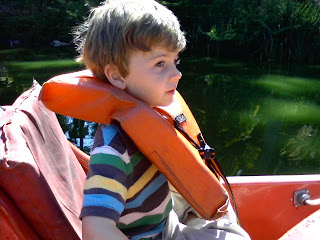Last month (or was it two or three months ago?) The Elegant Variation ran an interview with Victoria Patterson, author of the recently released novel Drift. (One of her professors jokingly called her "The Edith Wharton of the O.C.")
Anyway, in the interview she talked about her time in grad school and what it's like to be a parent and a writer.
Here's the quote that struck me and that I've been meaning to post for weeks:
"The most challenging thing was balancing my home life. My eldest son (seven at the time) experienced difficulties at school, meaning he wanted to quit school entirely. I remember he said, 'I wish you were a waitress again. I liked that better.' And I explained that when I was a waitress, I had been away from home more hours, because of my work schedule. But I knew my son was right, that even when I was home, I wasn’t home. I was constantly writing in my head. I even dreamed sentences. I remember sitting in on my son's first grade class, trying to assess what was going on with him in the classroom. I had a story due for workshop, so I was sitting in one of those little plastic chairs, hunched over, working on my computer, writing."
...even when I was home, I wasn't home. I was constantly writing in my head.
This is what really hit me. Because this is me. Because this is what I constantly worry about. The phrase I use is "perpetually distracted." That's how I feel sometimes -- distracted and distant -- and I think my wife would agree.
If I'm not writing/revising in my head or thinking about writing, I'm thinking about the fact that I'm not writing. Or I'm thinking where I should submit a story. Or which story I should work on next. But if I'm working on a story that means I'm not working on the novel. But maybe I should be working on that memoir I started. And on and on.
Writing is the last thing I think about when I go to bed. And it's often the first thing I think about when I wake up. If I don't write for a long period of time, I get cranky. I start to feel that I'm lost, adrift; that I won't be able to get back to where I was.
The fear I have, then, is that I'm not fully present for my family. They're not getting all of me. And I'm not fully allowing myself to be in the moment with them. On one level, I am always elsewhere. In writing la-la land. Perpetually distracted. Thinking of characters. Thinking of sentences. And it's not fair to my children. And it's not fair to my wife. I have no resolution here. I wish I did. All I know is that I need to find a better way to balance my life as a writer and as a parent/husband.
---
You can read the rest of the Victoria Patterson interview here.
And a while back, Pank posted some great essays about motherhood/fatherhood and writing. The motherhood essays feature Ethel Rohan, Angi Becker Stevens and Teresa Houle. The fatherhood essays feature David Erlewine and Ryan Bradley.




















